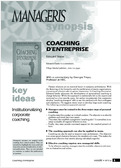Mentoring, an underutilized development tool

Mentoring means more than educating a spiritual son, but is an excellent means to transmit the knowledge and experience of old hands to the rest of the organization.
In Greek mythology, Mentor was an old man entrusted by Ulysses with the care and education of his son, Telemachus, while Ulysses was away at the Trojan War. This myth was the origin of the concept of “mentoring,” in which an experienced person trains a “protégé” in his or her image, transmits his or her experience, and in doing so, ensures his or her succession. This mechanism can be found in every type of organization – political, economic and military – where it is essentially used by mentors to prepare their “spiritual successors” and thus ensure that their work continues when they are gone.
Today, a growing number of companies see the expansion of mentoring as an effective way of developing the skills of more people, at all levels of the organization. And rightfully so, underline the publications we have selected, since mentoring offers undeniable advantages in this domain. However, this objective can be attained only under certain conditions:
– The full potential of mentoring cannot be tapped without challenging the traditional concept of the “master” bestowing knowledge upon the “apprentice.”
– Mentoring programs must be established that allow mentees to volunteer and take the initiative to participate.
– Mentors and mentees must be educated in the rules of mentoring.
SubscriberSign in
to download
the synopse (8 p.)
VisitorI want to buy
this synopsis (8 p.)
VisitorI want
to subscribe
See also

Own your position as a manager-coach
Most managers tend to focus more on operational matters than on the development of their staff. Beyond a scheduling issue, it is more a matter of personal stance. How can you be an effective manager-coach?



